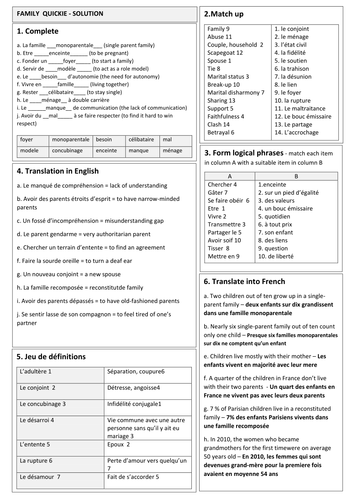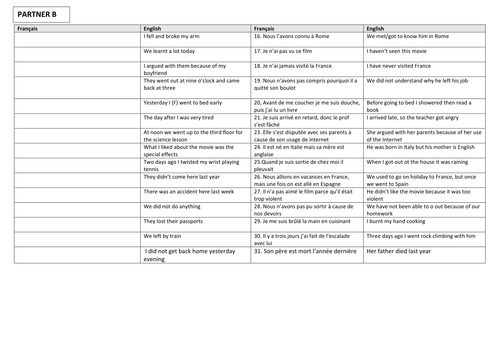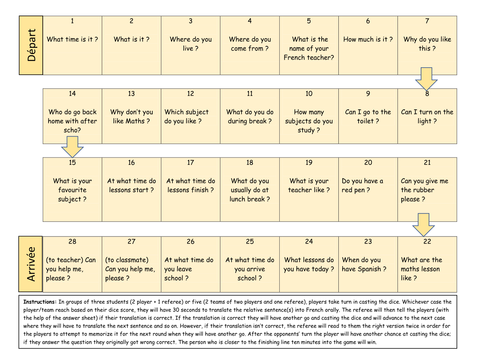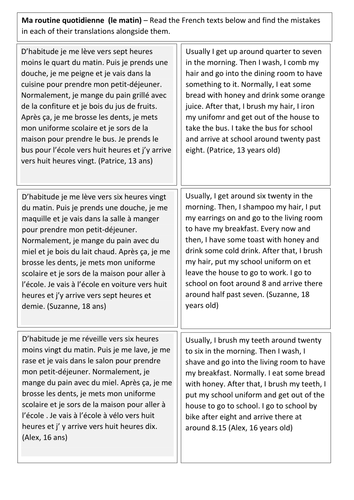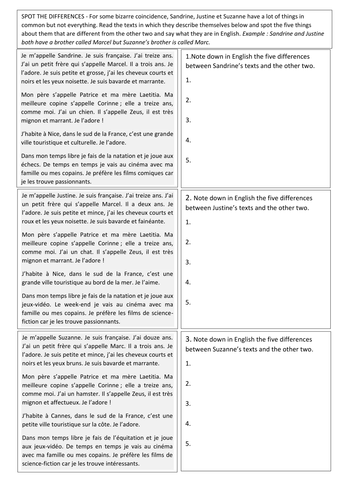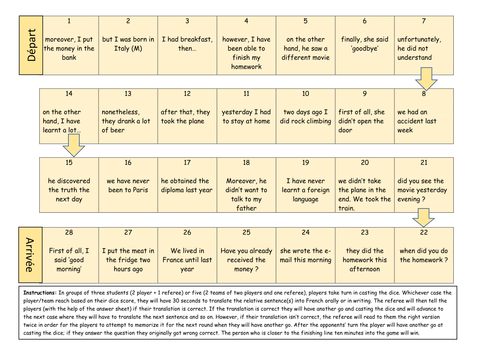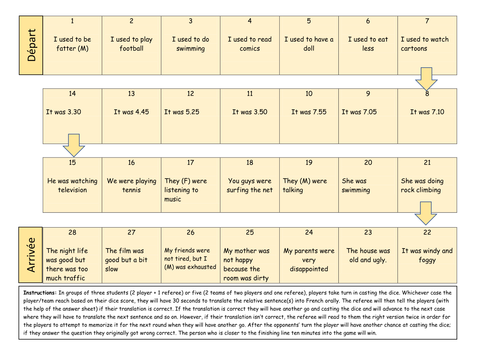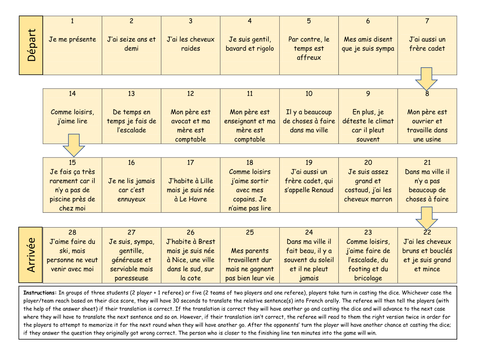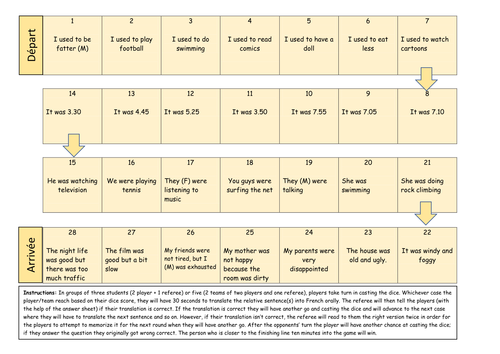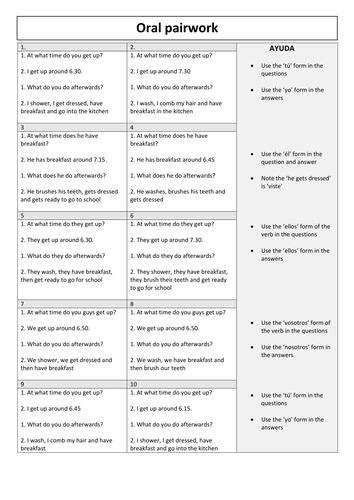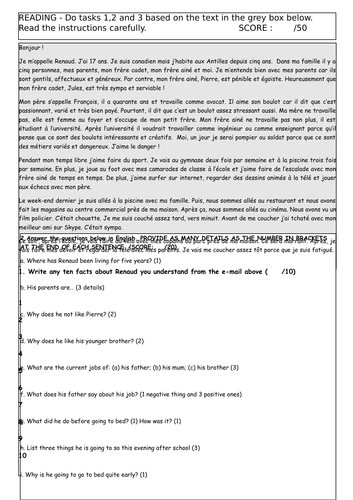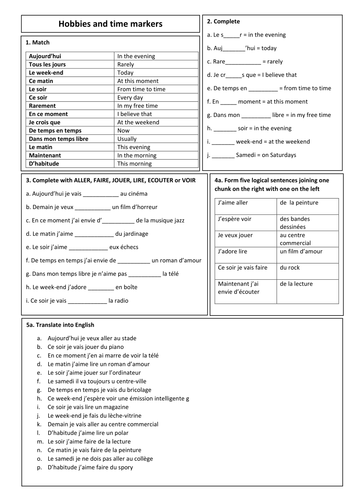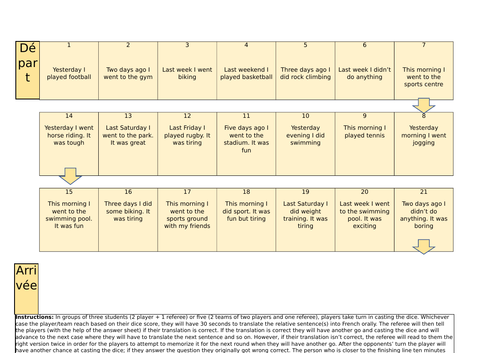
391Uploads
3157k+Views
5762k+Downloads
All resources

A LEVEL REVISION QUICKIE - FAMILY (WITH SOLUTION)
A challenging consolidation sheet for A-level students covering key vocabulary

GCSE revision starter - Oral ping-pong translation on imperfect/conditional (amended version)
Oral pairwork - translation

GCSE French revision quickie (2017) - Present tense of irregular verbs (Solution provided )
A quickie covering key irregular verbs . Answer key provided on separate sheet

GCSE revision - Oral ping-pong translation__perfect tense
Another oral ping-pong translation
INSTRUCTIONS - The students work in pairs. They have a sheet with the same English sentences to translate into French, but Partner A has the translation of sentences 1 to10, whereas Partner B has the translation of sentences 11 to 20.
I call it 'Oral ping-pong translation' because they do it orally, Partner A challenging Partner B with a sentence and showing the correct answer to provide them with feedback and to award points (3 for perfect sentence, 2 for one mistake only, 1 if there are mistakes but at least the verb is correctly formed). I give them a time limit (10 minutes); when the time is up the person with the higher score wins. Best to have people of similar ability in each pair. Here is an example: I made for a very able year 11 of mine. Obviously the activity can be done in writing too.
As a follow-up, I get the students to make a note of the most serious mistakes they made in their books so that I have an idea of what their problem areas are. Differentiation opportunities are obvious: different sets of sheets for groups of different ability

Year 7 / 8 French - Oral board game on high-frequency school-related phrases
Instructions: In groups of three students (2 player + 1 referee) or five (2 teams of two players and one referee), players take turn in casting the dice. Whichever case the player/team reach based on their dice score, they will have 30 seconds to translate the relative sentence(s) into French orally. The referee will then tell the players (with the help of the answer sheet) if their translation is correct. If the translation is correct they will have another go and casting the dice and will advance to the next case where they will have to translate the next sentence and so on. However, if their translation isn’t correct, the referee will read to them the right version twice in order for the players to attempt to memorize it for the next round when they will have another go. After the opponents’ turn the player will have another chance at casting the dice; if they answer the question they originally got wrong correct. The person who is closer to the finishing line ten minutes into the game will win.

Year 7 / 8 French - Oral translation board game
Instructions: In groups of three students (2 player + 1 referee) or five (2 teams of two players and one referee), players take turn in casting the dice. Whichever case the player/team reach based on their dice score, they will have 30 seconds to translate the relative sentence(s) into French orally. The referee will then tell the players (with the help of the answer sheet) if their translation is correct. If the translation is correct they will have another go and casting the dice and will advance to the next case where they will have to translate the next sentence and so on. However, if their translation isn’t correct, the referee will read to them the right version twice in order for the players to attempt to memorize it for the next round when they will have another go. After the opponents’ turn the player will have another chance at casting the dice; if they answer the question they originally got wrong correct. The person who is closer to the finishing line ten minutes into the game will win.

Year 7 French - Talking about school (receptive work: listening and reading)
A sentence builder to present the vocab (subjects, opinions, things one does around school) and a few receptive tasks to recycle it through listening and reading

Year 7 French - Narrow readings on 5 different topics
Narrow reading texts exploited through 'bad translation', 'spot the differences' and other techniques. Ideal for beginners on:
- hobbies
- general description
- morning routine
- adjectives (personality)
- sports
To find out more on this technique click here : https://gianfrancoconti.wordpress.com/2017/07/22/eight-narrow-reading-techniques-that-will-enhance-your-students-vocabulary-and-reading-skills/

Year 7/8 French - Narrow reading tasks on general description
Three narrow reading texts exploited through 4 different narrow reading tasks

KS3/4 French - Oral translation board game on Perfect tense of irregular verbs
Instructions: In groups of three students (2 player + 1 referee) or five (2 teams of two players and one referee), players take turn in casting the dice. Whichever case the player/team reach based on their dice score, they will have 30 seconds to translate the relative sentence(s) into French orally. The referee will then tell the players (with the help of the answer sheet) if their translation is correct. If the translation is correct they will have another go and casting the dice and will advance to the next case where they will have to translate the next sentence and so on. However, if their translation isn’t correct, the referee will read to them the right version twice in order for the players to attempt to memorize it for the next round when they will have another go. After the opponents’ turn the player will have another chance at casting the dice; if they answer the question they originally got wrong correct. The person who is closer to the finishing line ten minutes into the game will win.
I do a round in writing (students write on miniwhiteboards or iPads) then one or two orally changing partners each time. Students love it but adequate prep essential.

KS4 French - Imperfect : oral translation board game with answer key
Instructions: In groups of three students (2 player + 1 referee) or five (2 teams of two players and one referee), players take turn in casting the dice. Whichever case the player/team reach based on their dice score, they will have 30 seconds to translate the relative sentence(s) into French orally. The referee will then tell the players (with the help of the answer sheet) if their translation is correct. If the translation is correct they will have another go and casting the dice and will advance to the next case where they will have to translate the next sentence and so on. However, if their translation isn’t correct, the referee will read to them the right version twice in order for the players to attempt to memorize it for the next round when they will have another go. After the opponents’ turn the player will have another chance at casting the dice; if they answer the question they originally got wrong correct. The person who is closer to the finishing line ten minutes into the game will win.
I do a round in writing (students write on miniwhiteboards or iPads) then one or two orally changing partners each time. Students love it but adequate prep essential.

KS3/4 French - Pool of resources on "je me présente" (general personal details)
Three files, all recycling exactly the same vocabulary and patterns:
1. Three narrow reading texts a la Conti with a range of comprehension and an oral task.
2. An oral translation board game from French to English to do after 1
3. A gap fill task
4. An oral scaffold on the topic recycling all of the above
5. An oral translation board game from English to French

KS3-4 French - Collection of 11 oral translation board games on various topics / grammar structures
ANSWER KEY FOR EACH GAME PROVIDED
Instructions: In groups of three students (2 player + 1 referee) or five (2 teams of two players and one referee), players take turn in casting the dice. Whichever case the player/team reach based on their dice score, they will have 30 seconds to translate the relative sentence(s) into French orally. The referee will then tell the players (with the help of the answer sheet) if their translation is correct. If the translation is correct they will have another go and casting the dice and will advance to the next case where they will have to translate the next sentence and so on. However, if their translation isn’t correct, the referee will read to them the right version twice in order for the players to attempt to memorize it for the next round when they will have another go. After the opponents’ turn the player will have another chance at casting the dice; if they answer the question they originally got wrong correct. The person who is closer to the finishing line ten minutes into the game will win.
I do a round in writing (students write on miniwhiteboards or iPads) then one or two orally changing partners each time. Students love it but adequate prep essential.

KS3/4 French - Pool of resources on talking about TV
- reading tasks on opinions about tv
- consolidation activities
- a tile puzzle
- translation practice with answer key
- a sentence builder to introduce vocabulary
- talking mats to scaffold oral interaction with follow-up narrow reading

KS3 Spanish - Reflexive verbs in ARSE : grammar drills, narrow reading and a range of oral tasks
A series of preliminary old school grammar drills I stage before engaging in oral communicative drills,
a set of narrow reading tasks
Find-someone-who with cards
other oral tasks to recycle the same chunks of language everywhere WITH ANSWER KEY
oral board game recycling the very same chunks WITH ANSWER KEY (instructions included)
another set of old school drills for consolidation

KS3 French - Oral ping-pong translation: tv programmes and frequency in the present tense
INSTRUCTIONS - The students work in pairs. They have a sheet with two sets of English sentences to translate into French, but Partner A has the French translation of first set, whereas Partner B has the translation of second set. It is called 'Oral ping-pong translation' because they do it orally, Partner A challenging Partner B with a sentence and showing the correct answer to provide them with feedback and to award points (3 for perfect sentence, 2 for one mistake only, 1 if there are mistakes but at least the verb is correctly formed). I give them a time limit (10 minutes); when the time is up the person with the higher score wins. Best to have people of similar ability in each pair. As a follow-up, students to make a note of the most serious mistakes they made in their books so that I have an idea of what their problem areas are. Differentiation opportunities are obvious: different sets of sheets for groups of different ability

KS3 French - Reading comprehension on jobs, opinions and free time (three tenses)
A reading comp meant for my year 7s but can be used with year 8 too. Loosely based on Expo 2 rouge

French Beginners - HOBBIES: Narrow reading, Sentence builder and Vocabulary builder
Narrow reading, Sentence builder and Vocabulary builder , very successful with my students

KS3 French - Pool of resources talking about sport in the perfect tense (first person only)
A sentence builder, a survey, a board game and a vocabulary builder all recycling the same chunks of language

KS3/4 Spanish - Talking about hobbies in the preterite (all persons of Hacer, Ir and Jugar)
Old school drills, oral activity and vocabulary work on hobbies in preterite (all persons)

